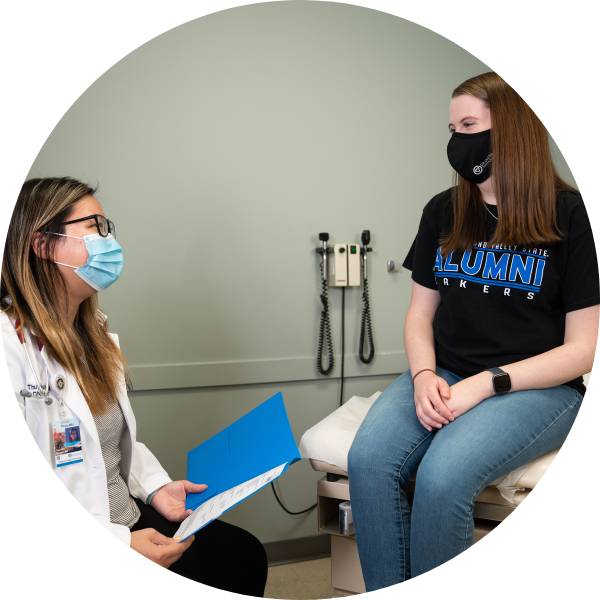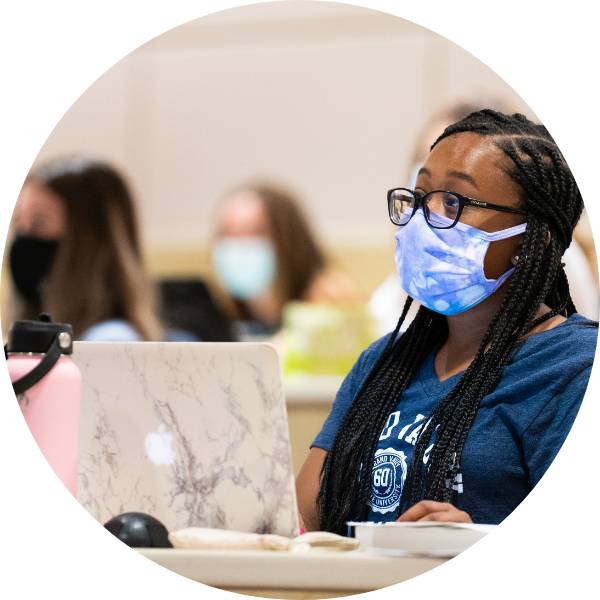Services Provided

Primary Care Services
Our providers deliver healthcare to your whole family, including newborns, children, and the elderly. This includes preventive visits or physical exams, acute illness visits, and follow-up visits. Our providers also make referrals to specialists when necessary.
- Same-day sick visits
- Primary and preventative care
- Sexual health
- Women’s health
- Immunizations
- Pediatrics
- Specialist and diagnostic referrals
- Nutrition counseling
Behavioral Health Services
- Individual and group therapy
- Substance use treatment
- Medication management
- Same day behavioral crisis appointments for existing patients
Social Work Services
- Therapy
- Case management services
- Community referrals and resources
*Video appointments are available for minor illnesses and follow-up appointments. Contact our office to schedule. Technical requirements: No apps or downloads required – our web-based appointments require an internet connection and device/computer with a camera.

Student Health Compliance Appointments
First Appointment:
- 1st Step TB Test ($15)
- Return in 48-72 hours for reading
- Antibody Titer Blood Draw ($40)
- Immunizations (if needed)
Second Appointment at least 7 days later:
- 2nd Step TB Test ($15)
- Return in 48-72 hours for reading.
- Participation Physical ($49)
- Booster Immunizations (if needed)
Bring ALL forms to appointments. Compliance requirements are dependent upon individual programs.
Compliance requirements, other than immunizations, are paid for out of pocket at the time of service. Immunizations will be billed to insurance. Please contact your insurance for questions regarding immunization coverage.
Sexual Health Services
We understand that sexual health can be a private and sensitive topic to discuss for some people. However, communication between you and those you have intimate relationships with, and you and your healthcare providers, is essential for your health. Our providers are focused on prevention, health promotion, and treatment. We cover areas such as sexually transmitted infections (STI) testing, PrEP (Pre-Exposure Prophylaxis), contraception, and cancer screening. We provide personalized healthcare for every individual’s needs.
STI TESTING IS QUICK AND PAINLESS
- Typically, for STI testing, a urine sample is collected. If you have physical symptoms, a visual inspection and swabbing of the affected area may be needed. In some cases, a small blood sample may be collected.
- Testing can be completed with your yearly physical, or anytime by making an appointment.
STI TESTING RECOMMENDATIONS
- Anyone who is experiencing symptoms of an STI should be tested. Some examples include genital discharge, difficulty with urination, lower abdomen pain, or sores around the mouth or genital area.
- All adults and adolescents from ages 13 to 64 should be tested at least once for HIV.
- All sexually active persons younger than 25 years should be tested for gonorrhea and chlamydia every year.
- Everyone 25 years and older with risk factors such as new or multiple sex partners or a sex partner who has an STI should also be tested for gonorrhea and chlamydia every year.
- All pregnant women should be tested for syphilis, HIV, and hepatitis B starting early in pregnancy. At risk pregnant women should also be tested for chlamydia and gonorrhea starting early in pregnancy. Testing should be repeated as needed to protect the health of mothers and their infants.
- All sexually active gay and bisexual men should be tested at least once a year for syphilis, chlamydia, and gonorrhea. Those who have multiple or anonymous partners should be tested more frequently for STIs (3 to 6-month intervals).
We offer PrEP (Pre-Exposure Prophylaxis) and PEP (Post Exposure Prophylaxis):
- PrEP or Pre-Exposure Prophylaxis is a medication that can reduce your risk of getting HIV. If you take PrEP as directed, it can reduce the chance that HIV will be able to infect your body. A once-daily pill is available for patients seeking PrEP.
- PEP or Post-Exposure Prophylaxis is a medication regimen that you can take if you believe you have just been exposed to HIV. If you take PEP as directed within 3 days after exposure, it can prevent HIV from infecting your body. If you had unprotected sex with or have been exposed to the blood from someone you think may be HIV positive, please make an appointment.
A cervical cancer screening is important preventative care for health maintenance. This screening is completed by performing regular Pap smear and HPV testing. Patients with a cervix, including transgender men who have not had their cervix removed, are recommended to have regular screenings. Below are the recommendations of when and how often screenings should be completed.
- Under 21: if you have been sexually active for 3 or more years.
- Age 21 to 29: Every 3 years with cytology (Pap testing), regardless of the age of onset of sexual activity or other risk factors.
- Age 30 to 65: Every 5 years with HPV co-test (Pap + HPV test) OR every 3 years with cytology.
When NOT to Screen
- Younger Than Age 21: Screening is not recommended for women younger than age 21.
- Older Than Age 65: No screening past age 65 if adequate prior screening can be assessed accurately (three consecutive negative cytology results or two consecutive negative HPV results within 10 years before screening cessation, with the most recent test occurring within 5 years) and not otherwise at high risk for cervical cancer.
There are many forms of contraception (birth control), some include: male or female condoms, oral pills, patches, and Depo-Provera shots. You should talk with your provider about your goals to find out which type of contraception is best for you.
